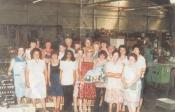Browse the interviews
Sorted by interviewee name
VN038 Keith Evans, Hotpoint, Llandudno
Keith was a roofer before he went to Hotpoint. He decided to go into a factory because he wasn't happy with the inequality in bonuses in the roofing trade. He wasn't sure if he would settle being in a factory after working outdoors but he did, and said he had to because he had four children to support. He worked on various different lines and said the training differed from one to another, with some lines just showing him what to do once and then letting him get on with it. He enjoyed Hotpoint, earning good money, especially for nights. He retired just short of 65.VN037 Margaret Evans, Hotpoint, Llandudno
Margaret began work in Hotpoint at the age of 39, although she'd already been working and had a family. Her husband Keith had started there the previous year. She had a week's training where she was one of only two females, the rest being male trainees, and she was the only one doing the tasks properly, whereas the men were cutting corners. She really liked the factory and the cameraderie and the wages were very high, especially for night shifts which she, and her husband, did for a long period of time, as her mother was able to look after the children. There was a real family atmosphere at Hotpoint even though it was a huge place and they had a lot of fun. She was a team leader on the wiring board section and a union rep for many years. She didn't want to move to Hotpoint Kinmel when the factory closed in 1992 but had no choice. She said the new factory was very different from the one in Llandudno and that they never really fitted in. Margaret retired in 1998.VSE052 Marjorie (Marge) Rita Evans, Welsh Trust, Rhigos;Sobells, Rhigos
Marjorie left school at 14 (1947) and started in Sobell’s. She started making one coil at a time and progressed to making 10 on the Westminster machine – dangerous because it was big and speedy. Whole TV sets including cabinets made there. When she went there they were making wirelesses and gramophones not TVs. Used Murphy factory’s nearby to make Sobell’s give them better bonuses. Until they got married she and her husband gave their pay to their mothers. She had an accident and no sick pay or compensation. Factories had a bad name, but she ‘loved it’. Men and women workers worked on line. Smell of wax, huge place with bays. She was asked to go to Welsh Trust to train workers on the big machines. The machines were ‘part of us.’ Though dangerous they didn’t like wearing turbans. Union – GMBU. She was a foreman for a while but then went back on machine. Dancing at weekends. Xmas dance in canteen. She stayed in Sobell’s for 12 years and worked in Welsh Trust for 5 years. She left when she had her son. In WT a smaller factory, winding coils for wirelesses and deaf aids. Couldn’t afford a TV when in Sobell's. Time and motion – she worked at a normal speed.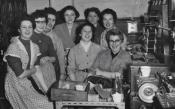
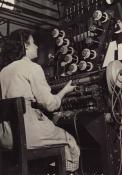
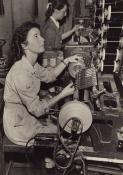
VN008 Mary Evans, James Kaylor Compacts, Caernarfon
Mary began in Kaylors when she was sixteen and she liked the work and the company. Her work was putting the polish on the compacts after they'd been dipped in acid, and putting the gems in them. Also she was making the tube that pushes the lipstick up. They could have rejects for free. She said factory work was an eye opener: “I was in my element there. Everyone was so close, there were 'rough and ready' girls but I liked them, I really liked then. I could listen to their stories, things I never got to hear at home, Good Lord!” The money was bad however - two pound something - and she left to go to Waterworths where the money was better. She met her husband in Waterworths left in 1961 to have a child but returned the following year. She left factory work in 1962 for office work to earn more money.VSE010 Brenda Mary Farr, Thorn Electronics, Hereford;Dressing Gown factory, Blaenavon;HG Stone Toy Factory, Pontypool
Mary left school at 15 (1956) – didn’t want to work in factory – wanted work in an office. But she found herself in HG Stone factory making soft toys - teddies and pandas etc– she worked on the line as a machinist. Piecework. Very big, noisy and dusty. Stuffed with straw or flock. Time and motion pricing time on each toy. Worker’s Playtime on the radio. Finished there in 1964. The women producing teddy bears got more than the others – specialist job. Wasn’t promoted because she talked too much. Also made dolls – plastic bodies and stitching on hair. Also dogs on wheels. Needles through fingers. Men’s work – on plastic and machines. Xmas dances with band. After 8 years in HG Stone spent 6 weeks in dressing gown factory in Blaenafon – couldn’t bear the smell of candlewick. When married she moved to Herefordshire – worked in Thorn Electrics making street lights. Lots of families in HG Stone (later Chad Valley) factory.Part of this interview is available as an audio file
VSE075 Era Francis, Smith's Crisps, Swansea
Era left school at 15 (1948) and after working in a laundry, she started in Smiths’ Crisps in 1951/2. She describes the departments in the factory and how everything worked to whistles. She wore a scarf over her hair. Her job was packing bags with crisps. She had to ask permission to leave machine. When hand packing fingers became sore because the crisps could be sharp. She used Nu-skin to put on sores. She worked there for 5-6 years. The smell of Smiths crisps. Those working upstairs in the kitchen had to wear clogs because the floor was slippery with oil. They cleaned the machines in her dept. every night. Rotation of work within dept. Bags of salt and the salt room. Radio and singing. Perk of buying crisps cheaper. They used glue to stick the packets together. Targets and getting bonuses. Some awful swearing there – particularly the older women. She was scared of them. When she got married she had a paid fortnight’s leave. Talks about the Empire theatre. She had to give her wages to her mother until 21 – rules. She left when she got married (1956) – the travelling was difficult. A lot of pushing and shoving to get on buses. Later she worked in Woolworth’s for 20 years.VSE023 Frances Francis, JR Freeman's Cigar Factory, Cardiff
Frances’ mother worked in the old cigar factory in North Clive Street – making them by hand. After leaving school at c.15 Frances worked in shops and then went to the new Freeman’s Factory – making them on machines. The smell there was sickly. When she was in training she broke the press – they put it in a glass case. A modern factory. The valley girls wore curlers – they hid cigars in the curlers! – spot checks. Toilet break timed. Horrendous noise of cutting cigars. Later worked in shop for 30 years. Piecework. Her factory number was 344. She has all her payslips. Knows of Miss Manikin competition. Her parents were poor - the story of the shoes. They could order cigarettes and cigars once a month e.g. 4 oz of Old Holborn. Frances never smoked.VSE080 Margaret Gerrish, Cora Garment Factory, Pengam;Spirellas Corset Factory, Cardiff;JR Freeman's Cigar Factory, Cardiff
Margaret talks of her father’s unionism NACODS and of leaving school at 13-4 (1944-5). She started working in a boarding school in Yeovil and then returned to Wales. She worked in Freeman’s. They travelled there from Tredegar by train. It was a new world. She saved with a provident cheque from her wages. The work was about earning money. Radio and singing. Shirley Bassey used to work there. Before Freeman’s she says she worked in Spirella’s. She had been apprenticed at The tailoring shop in New Tredegar- Parry’s. She didn’t go into the factory but did corset fittings for people in their homes. She had a skirt and jacket made for herself at Spirella’s. In c.1949-50 she went to Cora’s, making clothes for M&S and began in the cutting room. Supervisors were sent to Leicester to train. Then a new supervisor who began sacking workers. She was on examining and because one whole batch was bad he sacked them all. The union stood by them and they had their jobs back. After getting married she didn’t work in a factory.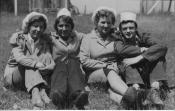
VSW060 Joan Gibbon, Fisher Price, Fforestfach;Mettoys, Fforestfach
After leaving school at 14, working in a laundry, getting married and having children Joan began working part-time in Fisher Price Factory making wooden toys in c.1973. They were afraid of the foreman because if the machines broke it stopped the assembly line. You had targets and bonuses. In winter it was very cold and in summer too hot. She moved to Mettoys c.1973 when Fisher Price closed. Again she left because the factory closed c.1983.